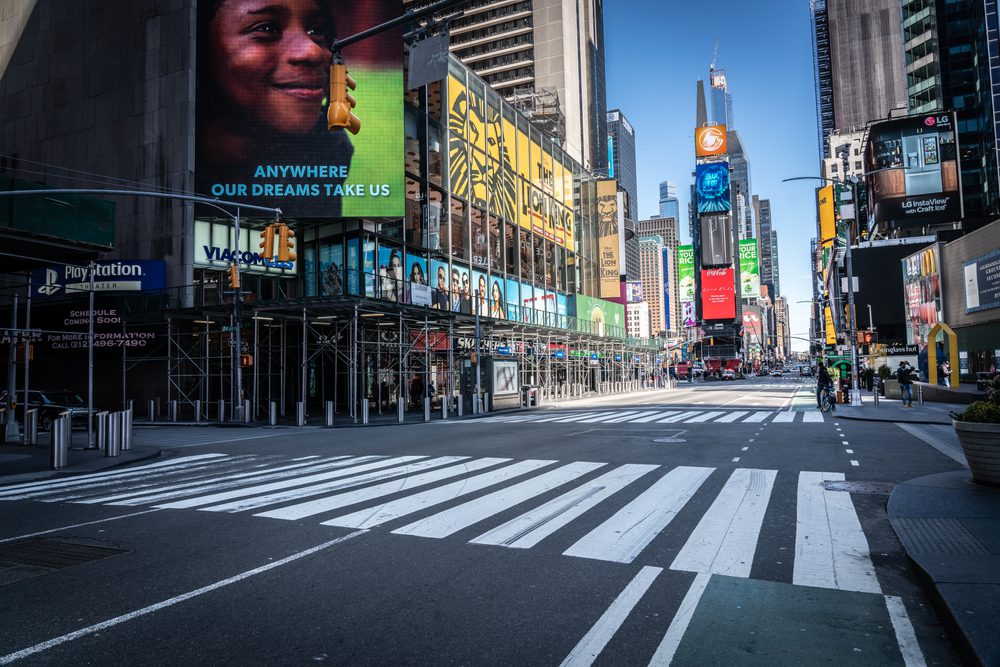Millions Flee the Cities, But Will They Ever Return?

For years, it seemed everyone was predicting the doom of small town USA. As manufacturing declined and smaller farms were made unprofitable by large-scale agriculture, cities—the seats of power and influence—became the be-all, end-all of our economy. The young were fleeing to them, companies were settling in them, and the small towns of flyover country were shrinking day-by-day.
COVID-19 is changing that.
Cities are no longer the shiny cosmopolitan playgrounds they once were. Not only are densely-populated cities a nightmare for virus spread, but urban areas were also hit harder by unemployment, and many of them have become ghost towns as inhabitants comply with social-distancing rules.
Today, many seek new places to live, and, as it turns out, the American countryside has a lot to offer. Over the years, technological advances in communication and collaboration have prompted many predictions that the popularity of high-density urban living would one day decline, but these predictions never came to pass. Although the internet and other technologies made remote work possible, and although the cost of living in the biggest U.S. cities continued to rise, it seemed that the physical and psychological benefits of big cities continued to outweigh the negatives.
Enter the pandemic. The COVID crisis stripped cities of all their benefits and heightened all their hardships. Due to high population density, health and safety concerns skyrocketed and mobility took a nosedive. Meanwhile, COVID-related unemployment made the already high cost of living unbearable.
Over the past few months, job loss forced many to leave cities and return to family homes. It’s estimated that nearly 3 million adults moved back in with parents or grandparents in March and April. After all, city living quickly loses its luster when you can’t socialize over drinks after work, enjoy dinner at the hottest restaurant, or attend the coolest gallery opening or music event—especially if all your friends have already left.
But it’s not just the jobless who are fleeing cities. There has also been an uptick in the very richest leaving town during the pandemic to work instead from country homes in smaller communities. New York City is a prime example: Between March 1 and May 5, while roughly 5 percent of all city residents left town, populations on the very wealthiest blocks decreased by as much as 40 percent.
These moves aren’t necessarily permanent, and many of these people will undoubtedly return. While the current pandemic may not mean the end of cities, it will likely speed up pre-existing trends as it pushes many to reassess their priorities and quality of life.
Rural communities and small and mid-size towns offer many appealing benefits. Some of the most obvious are their drastically lower costs of living, their proximity to nature, their abundance of space, and their lower crime rates. Add to that the fact that they seem less vulnerable to pandemics, and the scale starts to tip firmly in their favor. The increasing viability of remote work and improving resources in small towns are drawing residents away from metropolitan areas.
People are also realizing that smaller towns and cities may offer more than they once thought. Across the Midwest, for example, many towns and cities have managed to pivot from their industrial roots to offer opportunities in the technology and knowledge-based industries. And many rural communities have gone to great lengths to bring in high-speed internet, now offering some of the fastest, most affordable broadband in the country—and allowing for further growth and industry.
With this investment in technology and knowledge comes improvement to recreation. Taking advantage of growing markets, entrepreneurs move in to open restaurants, cafes, breweries and shops, revitalizing downtowns. Some of the very best food in the U.S. can be found in small-town America, from local cuisine to fine dining. These places will never rival the abundance of New York City or Los Angeles, but offer more than enough quality and variety to tempt displaced city-dwellers.
In addition, as the world struggles with the mental and psychological effects of living during a health crisis, the sense of solidarity a smaller community can offer is becoming much more important. Smaller cities tend to have more active community and civic engagement. People know one another, know when people are struggling, and can help each other out. Those in rural areas tend to be more socially trusting too, believing others are generally honest and possess integrity. Compare that with the relative anonymity and lack of connection in big cities.
With some companies already announcing plans to give employees the option of a permanent remote future, it seems likely that people will be reassessing the pay-off of returning to big cities if they are not tied to an office.
The U.S. is a country of small towns built on a strong tradition of community association and involvement. As more people rediscover the satisfaction and quality of life that can come from a slower pace of living, they may very well choose to stay.
Alice Calder is a contributor for Young Voices and TradeVistas, writing on issues in trade, the future of work, and the intersection of economics and culture. Follow her on Twitter @AliceCalder.
Comments